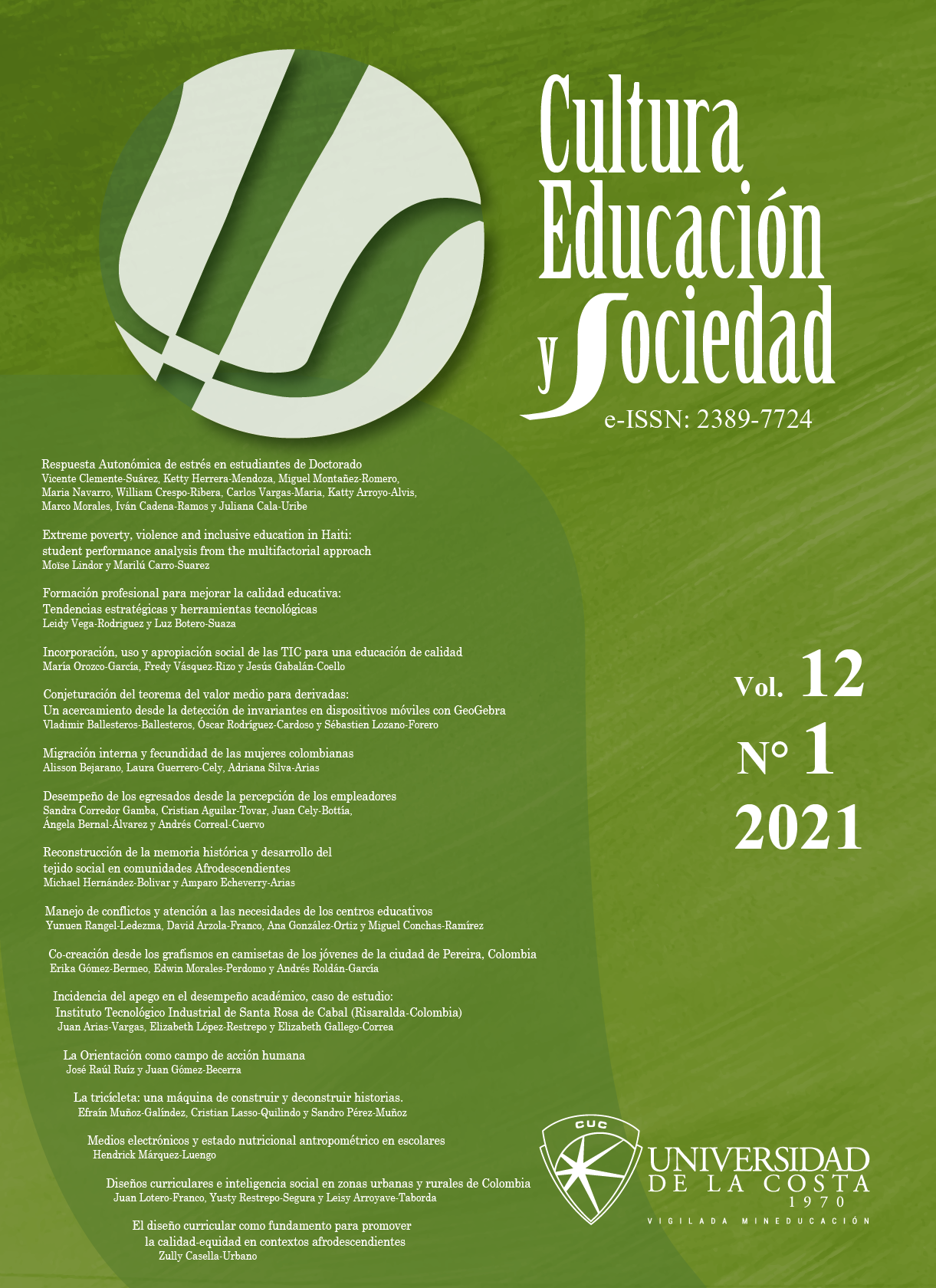Teaching philosophy statement and ideological becoming: from individual practice to social meaning
DOI:
https://doi.org/10.17981/cultedusoc.12.1.2021.20Keywords:
Ideological becoming, Teaching philosophy statement, Reflective practice, Teacher educationAbstract
The writing of a teaching philosophy statement can be interpreted as a dynamic component in the development of the teacher’s system of ideas, their ideological self. In this reflective article, the exercise of personal reflection and growth that promotes the development of a personal teaching philosophy is examined according to some available writing guidelines. Through a documentary method, the assumptions of the beliefs in question are argued in order to interpret them under the Baktinian concepts of heteroglossia and ideological becoming. The examination of heteroglossia in the text of a TPS increases the awareness of individual teaching activity connected to broader social, cultural, and political practices built through writing. These considerations are intended to connect the activities of educators with the possibility of more democratic societies.
Downloads
References
Arán, P. (2006). Nuevo diccionario de la teoría de Mijaíl Bajtín. Córdoba: Ferreyra Editor.
Bakhtin, M. (1981). Discourse in the novel. In M. Holquist (Ed.). The dialogic imagination: Four essays by M. M. Bakhtin. (C. Emerson & M. Holquist, Trans.). Austin: University of Texas Press.
Beatty, J., Leigh, J. & Dean, K. (2009a). Finding our roots: An exercise for creating a personal teaching philosophy statement. Journal of Management Education, 33(1), 115–130. https://doi.org/10.1177/1052562907310642
Beatty, J., Leigh, J. & Dean, K. (2009b). Philosophy rediscovered: Exploring the connections between teaching philosophies, educational philosophies, and philosophy. Journal of Management Education, 33(1), 99–114. https://doi.org/10.1177/1052562907310557
Bohnsack, R., Pfaff, N. & Weller, W. (Eds.) (2010). Qualitative Analysis and Documentary Method in International Educational Research. Barbara Budrich Publishers. Available from: http://library.oapen.org/handle/20.500.12657/29452
Brookfield, S. (2017). Becoming a Critically Reflective Teacher. John Wiley & Sons.
Cathcart, A., Greer, D. & Neale, L. (2018). About Teaching Philosophies. [Online]. Available from: https://teachingadvantage.org/about-teaching-philosophies/
Chism, N. (1998). Developing a philosophy of teaching statement. Essays on Teaching Excellence, 9(3), 1–2. Available from: https://ucat.osu.edu/wordpress/assets/V9-N3-Chism.pdf
Colton, A. & Sparks-Langer, G. (1993). A conceptual framework to guide the development of teacher reflection and decision making. Journal of teacher education, 44(1), 45–54. https://doi.org/10.1177/0022487193044001007
Fook, J. (2010). Beyond reflective practice: reworking the ‘critical’in critical reflection. In: H. Bradbury, N. Frost, S. Kilminster & M. Zukas (Eds.), Beyond reflective practice: New approaches to professional lifelong learning (pp.37–51). Routledge.
Freedman, S. & Ball, A. (2004). Ideological becoming Bakhtinian concepts to guide the study of language, literacy, and learning. In A. F. Ball, S. W. Freedman & R. Pea Bakhtinian perspectives on language, literacy, and learning (pp. 3–33). Cambridge University Press. https://doi.org/10.1017/CBO9780511755002.001
Holdway, J. & Hitchcock, C. H. (2018). Exploring ideological becoming in professional development for teachers of multilingual learners: Perspectives on translanguaging in the classroom. Teaching and Teacher Education, 75, 60–70. https://doi.org/10.1016/j.tate.2018.05.015
Humphreys, P. (2020). Engage, empower, evolve: Developing an institutional teaching philosophy to engage staff. English Australia Journal, 36(1), 39.
Johns, C. (Ed.). (2017). Becoming a reflective practitioner. John Wiley & Sons.
Laundon, M., Cathcart, A. & Greer, D. A. (2020). Teaching philosophy statements. Journal of Management Education, 44(5), 577–587. https://doi.org/10.1177/1052562920942289
Merkel, W. (2020). “What I Mean Is…”: The role of dialogic interactions in developing a statement of teaching philosophy. Journal of Second Language Writing, 48. https://doi.org/10.1016/j.jslw.2019.100702
Nohl, A.-M. (2010). Narrative Interview and Documentary Interpretation. In: R. Bohnsack, N. Pfaff & W. Weller (Eds.) Qualitative Analysis and Documentary Method in International Educational Research. (pp.195–217). Barbara Budrich Publishers.
Norris, C. (2002). Heteroglosia (heteroglossia). In M. Payne (Comp.), Diccionario de teoría crítica y estudios culturales. Buenos Aires: Paidós.
Parr, G., Bulfin, S., Diamond, F., Wood, N. & Ceridwen O. (2020). The becoming of English teacher educators in Australia: a cross-generational reflexive inquiry. Oxford Review of Education, 46(2), 238–256. https://doi.org/10.1080/03054985.2019.1667319
Schön, D. (1987). Educating the reflective practitioner. San Francisco: Jossey-Bass Publishers.
Schön, D. (1983). The reflective practitioner. New York: Basic Books.
Schönwetter, D., Sokal, L., Friesen, M. & Taylor, K. (2002). Teaching philosophies reconsidered: A conceptual model for the development and evaluation of teaching philosophy statements. International Journal for Academic Development, 7(1), 83–97. https://doi.org/10.1080/13601440210156501
Sharma, B. & Phyak, P. (2017). Criticality as ideological becoming: Developing English teachers for critical pedagogy in Nepal. Critical Inquiry in Language Studies, 14(2-3), 210–238. https://doi.org/10.1080/15427587.2017.1285204
Thompson, S. & Thompson, N. (2008). The critically reflective practitioner. Macmillan International Higher Education.
Yeom, Y., Miller, M. A. & Delp, R. (2018). Constructing a teaching philosophy: Aligning beliefs, theories, and practice. Teaching and Learning in Nursing, 13(3), 131–134. https://doi.org/10.1016/j.teln.2018.01.004
Published
How to Cite
Issue
Section
License
Copyright (c) 2021 CULTURA EDUCACIÓN Y SOCIEDAD

This work is licensed under a Creative Commons Attribution-NonCommercial-NoDerivatives 4.0 International License.
![]()
Creative Commons 2020 CULTURA EDUCACIÓN Y SOCIEDAD
This article is under international license Creative Commons Reconocimiento-NoComercial-SinObrasDerivadas 4.0.
The published articles are the sole responsibility of their authors and do not necessarily reflect the opinions of the editorial committee.
CULTURA EDUCACIÓN Y SOCIEDAD respects the moral rights of its authors, who assign to the editorial committee the patrimonial rights of the published material. In turn, the authors inform that this work is unpublished and has not been previously published.
All articles are under a:
Licencia Creative Commons Atribución-NoComercial-SinDerivadas 4.0 Internacional.
![]()


 English
English
 Español (España)
Español (España)




_12.53_.27_p_. m_._3.png)





_12.57_.35_p_. m_._3.png)
_12.50_.37_p_. m_._3.png)



